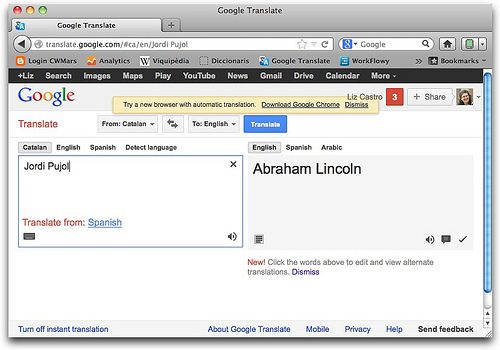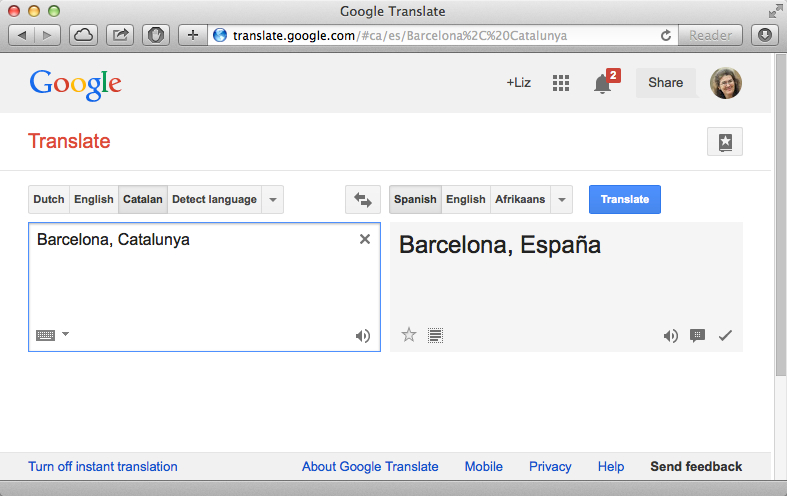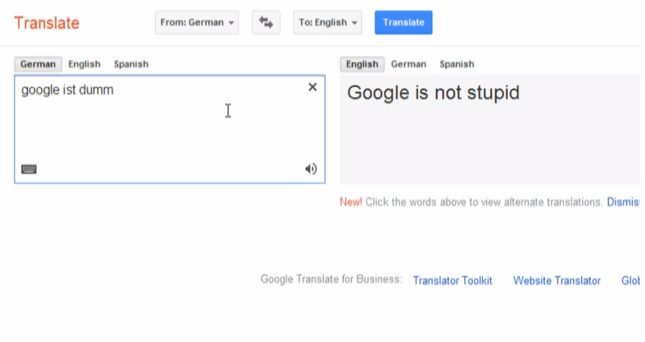08.03.2014 - 10:47
Àlex Hinojo discovered this morning that if you type ‘Barcelona, Catalunya’ in Catalan into Google Translate, and then ask for the translation into Spanish, the answer is ‘Barcelona, España’. Has Google gone Spanish-nationalist?
Millions and millions of people use Google Translate every day to make sense of an every more international web. And while everyone knows that the translations are sometimes less than perfect, it’s still an excellent tool for getting the gist of a foreign text.
Famous errors
Nevertheless, some of Google’s errors have become famous. For example, during a time, if you typed ‘Jordi Pujol’—Catalonia’s long time president between 1980-2003—in Catalan, the English translation came back as ‘Abraham Lincoln’. While the suspicious might wonder if some Catalan techie had rigged Google Translate to make the former Catalan politician look good, a more likely possibility is simply a flaw in Google’s ‘statistical machine translation’.
How Google Works
As Google explains on its website, the translation service does not use human translators and it doesn’t use a rule-based system. Instead, it compares millions and even billions of already translated documents looking for statistical matches. ‘By detecting patterns in documents that have already been translated by human translators, Google Translate can make intelligent guesses as to what an appropriate translation should be,’ Google explains on its About Google Translate page.
Easter Eggs sow suspicion
The existence of obvious Easter Eggs, however, makes people suspicious about whether certain incorrect translations are intentional. For example, for a time if you typed ‘google ist dumm’ in German, the English translation was ‘Google is not stupid’. There is certainly no body of German to English translated literature that could result in such a clearly pro-Google, erroneous translation.
Catalunya is España?
What about the case of Google’s translation of ‘Barcelona, Catalunya’ in Catalan into ‘Barcelona, España’ in Spanish? Is Google intentionally trying to communicate that Catalonia is Spain, as Spanish nationalists are fond of insisting? Probably not. Indeed, the real answer is perhaps more insidious. Since Google bases its results on existing documents, a more reasonable explanation is that there is already a huge collection of files that use ‘Barcelona, Catalunya’ in their Catalan editions and ‘Barcelona, España’ in their Spanish editions.
Nevertheless, what may be a common, expedient, or a politically correct (or incorrect) translation, is not necessarily an accurate translation. Whatever your political persuasion, there is a perfectly good and accurate word for ‘Catalunya’ in Spanish, and Google should use it. Users can click the Send Feedback button at the bottom of the Google Translate page in order to point out Google’s error so that they can fix it in the future. Google no longer thinks Abraham Lincoln is a good translation for Jordi Pujol. They will soon realize that Catalunya is not España.





